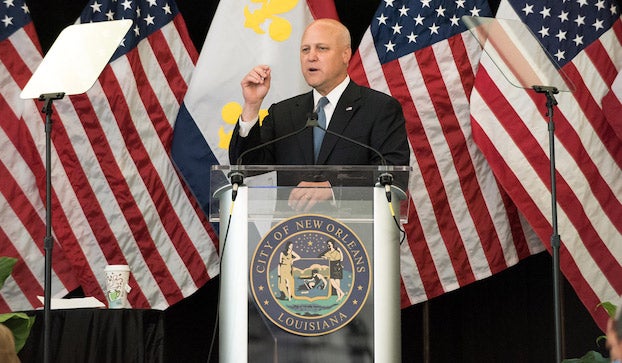Landrieu back in spotlight with infrastructure task
Published 5:00 am Sunday, November 21, 2021

- (Associated Press)
NEW ORLEANS — Former New Orleans Mayor Mitch Landrieu left office nearly four years ago, winning national accolades for removing landmark Confederate monuments after jump-starting the recovery from Hurricane Katrina’s catastrophic levee failures and flooding.
Once considered a possible presidential contender, Landrieu is back in a big way. He was tapped this week by President Joe Biden, a fellow Democrat, to coordinate more than $1 trillion in national infrastructure spending. His job, Biden said Thursday: “Making sure that everything gets out and it goes where it’s supposed to go.”
“He’s the perfect person for this job,” said Walter Isaacson, the New Orleans-born historian, journalist and author who played a role in Katrina recovery efforts. “He loves the geeky details of infrastructure and he loves bringing people together for great projects.”
Andy Kopplin, a deputy mayor under Landrieu and chief of staff to two former Louisiana governors, said Landrieu’s skill with logistics will be a strength in his new role.
“There will be a thousand billion-dollar projects in this trillion dollar bill,” Kopplin said. “He was always focused on having the resources hit the ground at the right time, and that’s what’s critical with the coordination that he’s going to be tasked with.”
Landrieu’s administration wiped out a nearly $100 million deficit and drew billions of dollars in federal aid to step up a plodding recovery from Katrina under former Mayor Ray Nagin, who later went to prison for corruption.
Under Landrieu, New Orleans secured federal money for repair and revitalization of fire and police stations, libraries, school buildings, roads and drainage and public recreation areas that were devastated when federally built levees failed during the storm. Landrieu also led development of a new state-of-the-art international airport, something state and city leaders had been talking about for decades.
Landrieu won landslide mayoral victories in 2010 and 2014. He was term-limited when he left the mayor’s seat in 2018 and his political future at that point was murky. Although he had twice won election as lieutenant governor, his prospects for another statewide run were dubious in a reliably Republican state. Mary Landrieu, by then, had lost her seat to Republican Bill Cassidy and the state had gone big for Donald Trump in 2016.
Landrieu’s doggedness in taking down monuments like the larger-than-life statue of Robert E. Lee towering over St. Charles Avenue was unpopular among some white voters.
And he was on the defensive toward the end of his tenure over violent crime, the slow pace of some projects and myriad problems at the agency overseeing street drainage and drinking water systems.
Nationally, however, he was sometimes mentioned as a possible 2020 candidate for the Democratic presidential nomination, particularly after the removal of the Lee statue and a speech decrying the monuments as part of “a fictional, sanitized Confederacy.”
He discounted talk of national ambitions and never entered the race. He promoted a book, provided some political commentary on CNN and devoted time to the E Pluribus Unum project, a nonprofit he started to break down racial divides.
A former state legislator and lieutenant governor, Landrieu was steeped in progressive politics since childhood. His father, Moon Landrieu, was a two-term mayor who brought Black politicians into city government in the 1970s, served in President Jimmy Carter’s Cabinet and later became a judge. His sister is three-term former U.S. Sen. Mary Landrieu.
While his new role places him, again, in charge of major infrastructure undertakings, matters of race are still involved.
“We get to fix a lot of roads, bridges, ports, rail lines and airports,” Landrieu, 61, said in a statement issued Monday morning. “And racial equity will be a core focus of the implementation of this historic infrastructure package.”





